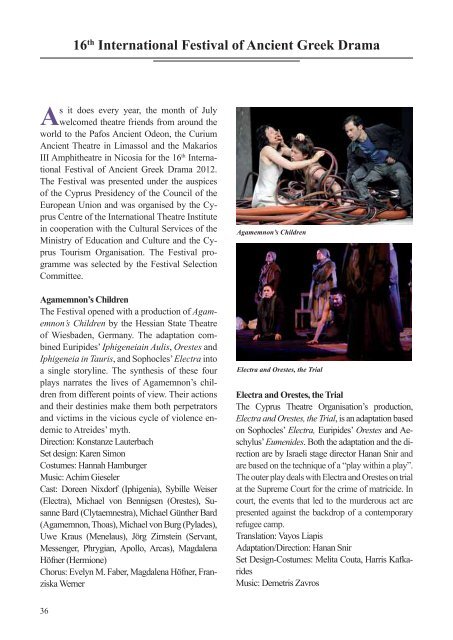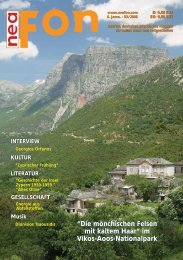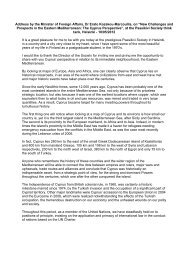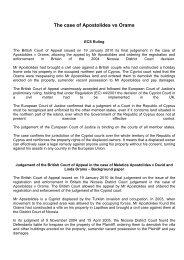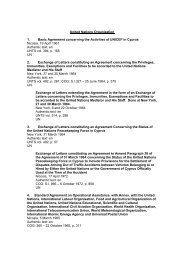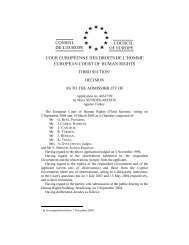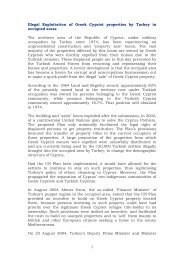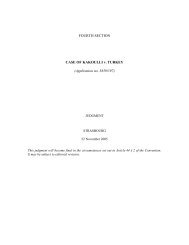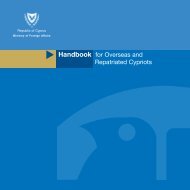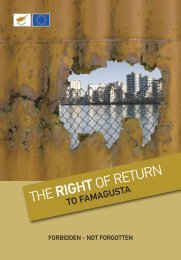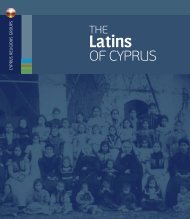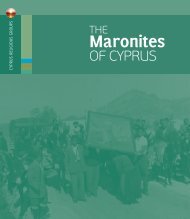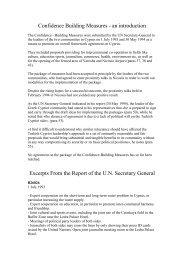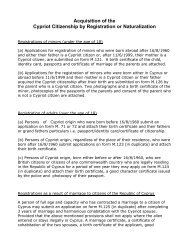Volume L, No 3, July-September 2012 - Ministry of Foreign Affairs
Volume L, No 3, July-September 2012 - Ministry of Foreign Affairs
Volume L, No 3, July-September 2012 - Ministry of Foreign Affairs
You also want an ePaper? Increase the reach of your titles
YUMPU automatically turns print PDFs into web optimized ePapers that Google loves.
16 th International Festival <strong>of</strong> Ancient Greek Drama<br />
As it does every year, the month <strong>of</strong> <strong>July</strong><br />
welcomed theatre friends from around the<br />
world to the Pafos Ancient Odeon, the Curium<br />
Ancient Theatre in Limassol and the Makarios<br />
III Amphitheatre in Nicosia for the 16 th International<br />
Festival <strong>of</strong> Ancient Greek Drama <strong>2012</strong>.<br />
The Festival was presented under the auspices<br />
<strong>of</strong> the Cyprus Presidency <strong>of</strong> the Council <strong>of</strong> the<br />
European Union and was organised by the Cyprus<br />
Centre <strong>of</strong> the International Theatre Institute<br />
in cooperation with the Cultural Services <strong>of</strong> the<br />
<strong>Ministry</strong> <strong>of</strong> Education and Culture and the Cyprus<br />
Tourism Organisation. The Festival programme<br />
was selected by the Festival Selection<br />
Committee.<br />
Agamemnon’s Children<br />
The Festival opened with a production <strong>of</strong> Agamemnon’s<br />
Children by the Hessian State Theatre<br />
<strong>of</strong> Wiesbaden, Germany. The adaptation combined<br />
Euripides’ Iphigeneiain Aulis, Orestes and<br />
Iphigeneia in Tauris, and Sophocles’ Electra into<br />
a single storyline. The synthesis <strong>of</strong> these four<br />
plays narrates the lives <strong>of</strong> Agamemnon’s children<br />
from different points <strong>of</strong> view. Their actions<br />
and their destinies make them both perpetrators<br />
and victims in the vicious cycle <strong>of</strong> violence endemic<br />
to Atreides’ myth.<br />
Direction: Konstanze Lauterbach<br />
Set design: Karen Simon<br />
Costumes: Hannah Hamburger<br />
Music: Achim Gieseler<br />
Cast: Doreen Nixdorf (Iphigenia), Sybille Weiser<br />
(Electra), Michael von Bennigsen (Orestes), Susanne<br />
Bard (Clytaemnestra), Michael Günther Bard<br />
(Agamemnon, Thoas), Michael von Burg (Pylades),<br />
Uwe Kraus (Menelaus), Jörg Zirnstein (Servant,<br />
Messenger, Phrygian, Apollo, Arcas), Magdalena<br />
Höfner (Hermione)<br />
Chorus: Evelyn M. Faber, Magdalena Höfner, Franziska<br />
Werner<br />
Agamemnon’s Children<br />
Electra and Orestes, the Trial<br />
Electra and Orestes, the Trial<br />
The Cyprus Theatre Organisation’s production,<br />
Electra and Orestes, the Trial, is an adaptation based<br />
on Sophocles’ Electra, Euripides’ Orestes and Aeschylus’<br />
Eumenides. Both the adaptation and the direction<br />
are by Israeli stage director Hanan Snir and<br />
are based on the technique <strong>of</strong> a “play within a play”.<br />
The outer play deals with Electra and Orestes on trial<br />
at the Supreme Court for the crime <strong>of</strong> matricide. In<br />
court, the events that led to the murderous act are<br />
presented against the backdrop <strong>of</strong> a contemporary<br />
refugee camp.<br />
Translation: Vayos Liapis<br />
Adaptation/Direction: Hanan Snir<br />
Set Design-Costumes: Melita Couta, Harris Kafkarides<br />
Music: Demetris Zavros<br />
36


